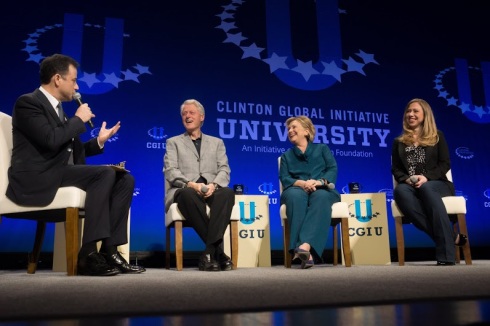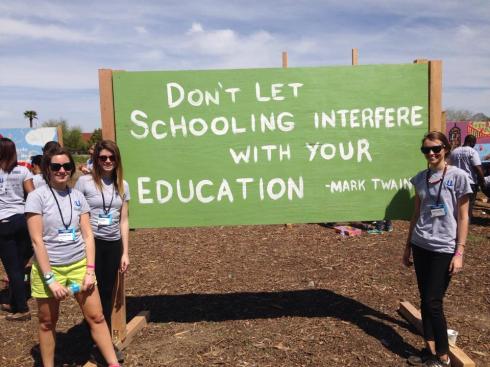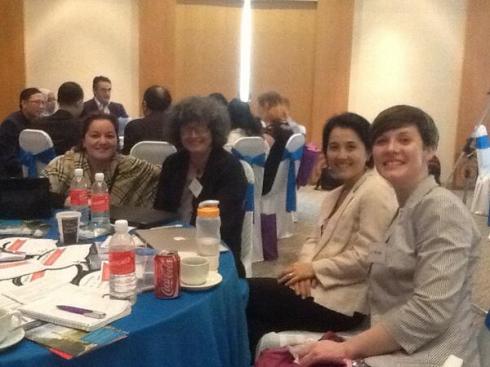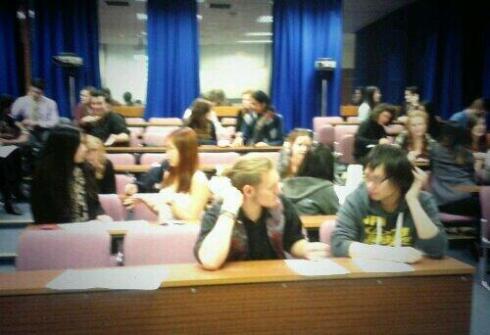“Don’t let schooling interfere with your education”
Reflections on the Clinton Global Initiative University 2014
Paul Iannetta
In March 2014, the partnerships that exist between 30 Scottish and Tanzanian schools (see http://www.twendepamoja.org.uk/education for details) were highlighted at the Clinton Global Initiative University (CGIU) in Phoenix, Arizona.
CGIU was launched by President Bill Clinton in 2007. It is, to use the website’s own words, “a meeting where students, youth organisations, topic experts and celebrities come together to discuss and develop solutions to global challenges”. Students are chosen to attend based on the “commitment to action” they develop. Commitments must be new, specific and measurable means of addressing a global challenge. The University of Edinburgh joined the network of universities whose students attend CGIU in 2014 and my commitment was one of four chosen from Edinburgh.
You may be wondering what my commitment was.
First, let me explain the background to it. I visited Tanzania in 2008, left Holy Rood High School in 2009 and have remained involved with Twende Pamoja (Swahili: Let us Walk Together) since then. It is unusual for so many schools across both the primary and secondary sectors to both link with schools in another country and work together. In the last few years, pupils have connected by letter, live video and exchange visits in both directions. Young people in every partner primary and secondary school and community have together created their global vision of how they would like the world to be. Over 13,000 young people have now been involved in this process, many through a variety of seminars and workshops. All of these activities, meetings and gatherings help raise awareness in very practical and personal ways of what life is like on another continent and within another culture. School partnerships can make an effective contribution to global education and in encouraging young people to see themselves as global citizens.
There are two significant obstacles that can contribute to school partnerships working less effectively: lack of time and ever-changing personnel. Students have increasing amounts of coursework and examinations every few months and consequently find their free time limited. Staff face the demands of teaching, curriculum development and assessment as well as pursuing their own personal commitments and interests. Students who have been involved with school partnerships eventually leave school and may pursue other activities in other cities. Staff may move on or retire. A challenge I have become very aware of is to find ways for staff and students to effectively pass on their knowledge and experience to ensure the ongoing development and sustainability of the partnership. Where this does not happen the benefits of a partnership may not be fully realised and the relationship itself may even be lost.
It is with this in mind that I have committed to the creation of a partnership pack for Scottish and Tanzanian schools. The partnership pack will draw on and bring together the best practice from each school in both countries. Therefore, when a school comes to fundraise for a trip to Tanzania by way of a sponsored bag pack, for example, it will know exactly which supermarkets have participated in the past, how much was raised and who to contact to arrange it. A partnership pack would also contain the contact details of students, in Scotland and in Tanzania, who have participated in a trip in the past and are willing to visit a school and speak or answer questions. A partnership pack for a Tanzanian school might contain an international SIM card and iPad-type device to allow for video calls between students in both countries. In short, a partnership pack is designed to provide resources, ideas and advice to keep school partnerships strong even though the people in them may change.
The pack is very much still in the development phase at present but was well received by others attending CGIU. My priority now is to secure funding for the project and to conduct research into content in both Scotland and Tanzania.
As for the CGIU conference itself, it was hard not to be inspired to act listening to Bill, Hillary and Chelsea Clinton, political heavyweights John McCain and Gabrielle Giffords, the Wikipedia founder, Jimmy Wales and women’s rights activist, Manal al-Sharif, to name but a few. The event was also a unique opportunity to meet some of the 1000 other students from 80 countries, some of whose commitments to action also featured Tanzania. Many business cards were exchanged and e-mails sent afterwards. All the sessions were recorded and can be viewed at http://new.livestream.com/CGI/CGIU2014.
One of the speakers was Bunker Roy of India’s Barefoot College. He quoted Mark Twain in response to a question he was asked that weekend – ‘don’t let schooling interfere with your education’, he said. As can be seen from the picture below, this quotation made an impression on a few of us attending CGIU. Education can often appear to be driven by the requirements of the examination system. The Scottish vision of education identifies the 4 capacities, which all centres of learning must work to nurture. As well as producing successful learners they must also produce confident individuals, effective contributors and responsible citizens. It is my experience as a school pupil and as a student that partnerships between schools and other educational institutions in different countries can make a significant contribution to this process and the quality of the learner’s experience.
If this partnership pack, even in a small sense, helps Scottish and Tanzanian young people become global citizens, contributes to their development of a global vision and supports those leading partnerships to sustain their growth it will have been a success.
Paul Iannetta
April 2014














